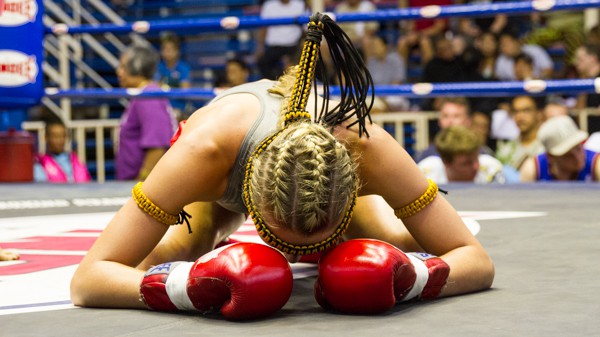
10 Challenges & Opportunities: Owning a Muay Thai Camp in Thailand
Owning a Muay Thai Camp in Thailand
“We are what we are. We are all different, the product of both our genes and our experiences.” Ron Davies, Secretary of State for Wales 1997-1998
This was Ron Davies’s defense for a “moment of madness’ that ended his political career. It’s the same the world over, our background determines us.
In a previous blog I outlined the background of Muay Thai fighters/trainers. This blog highlights how these factors make running a Muay Thai camp in Thailand a hugely different experience to running a similar facility elsewhere. Some of the protocols we have put in place to overcome the cultural challenges faced are described. I cannot begin to claim that we have all the answers but our gym is still here and the business is growing. We must be doing something right!
My blog on Muay Thai Trainers: Culture and Education explained that the majority of trainers/fighters come from poor rural areas of Thailand. Most have limited education beyond the age of 13. Outside the gym environment, their experience of life and business is limited. Being brought up during their adolescent years in a harsh but supportive gym in environment has shaped them. Muay Thai has literally encompassed most of their adult life. There are no comparisons for this because it literally doesn’t happen anywhere else in the world.
Fighters become very dependent on the rigid, but supportive, structure and discipline of the gym environment. This underpinned their formative years. Without these crutches to give structure to their daily life, in the past as they got older many lost themselves to gambling, drinking, or drug addiction. I don’t have the statistics to prove it but I believe the incidence of this is decreasing as the opportunities for ex fighters are growing.
Fighters now have the chance to make a very successful living both in Thailand and overseas. This is in sharp contrast to the past where many found themselves thrown from the pinnacles of fight success (and the narcissism that goes with it) to hopelessness and despair. Once they were too old to fight and make money for their gym/managers, they faced an uncertain future. They were confronted with the potential of never being the focus of attention again.
In order to understand what goes on in a Muay Thai camp in Thailand, you have to understand three of the main guiding principles that operate. These impact heavily.
- Loyalty
In a society where consumer and police protection is not to the same standard as we in the west are used to enjoying, loyalty assumes great importance in daily life. You look after the people you are close to (such as family, people you grew up with, people who can help you), regardless of the circumstances. In the gym environment, fighters/trainers who come from the same gym as one another have a very close bond.
- Nationalism
The Thais are fiercely proud of their nation and their independence. Their country has never been occupied. They are taught from a young age to put their nation’s interests before their own. In a dispute involving a person of another nationality, a Thai will usually support another Thai.
- Respect
Showing respect in the right places in Thailand is hugely important. Similar to loyalty and nationalism, respect is unconditional based on certain premises. This can be confusing to other cultures where respect is earned rather than demanded. Within a Muay Thai gym; age, teaching status and prowess are hugely important in determining order.
Challenges and Opportunities
Recruitment
Staff recruitment is usually informal in Muay Thai camps in Thailand. Members of staff are not formally assessed and vetted. As there is no over-riding protocol and the business is very competitive, gyms prefer not to divulge information about past employees, either positive or negative. Most trainers are recruited through someone they know at the camp. Often they are known to one another from their fighting days, usually because they trained at the same gym when they were young. This is particularly so in Thai owned gyms where a large proportion of the trainer base originates from the same (or associated) gym as the owner.
Whilst in some ways this makes recruitment quicker and easier, it means that unless you know the candidate yourself, you don’t know what you are getting until they arrive.
Employment contracts
To my knowledge most trainers are employed on a casual basis. There are usually no terms of employment that hold either the employer or the employee to anything. The advantage of this is that if an employee is unsuitable for the work or if their performance is not of the required standard, termination of employment is relatively easy. This disadvantage, of course, is that there is nothing to hold the employee to you either. Thai staff frequently leave their employment without giving any notice which can cause great disruption to the business.
We have introduced employment contracts. These help us overcome a number of the challenges we face on a day to day basis.
Allegiance
This is a very complex area within a Muay Thai camp in Thailand. If everything is going well, a gym owner could not hope to have a more dedicated team than one comprised of Muay Thai trainers. This is certainly demonstrated clearly to the outside world at boxing stadiums. Corner men wear their gyms livery proudly, supporting a fighter and representing their camp. It’s wonderful for both the gym and the fighter to experience such dedication. It is also confusing to go to the stadium the following week only to see the same trainer wearing a different gym’s livery but showing equal enthusiasm. This is because what you are seeing is not a dedication to a particular gym brand, but rather to the greater Muay Thai good. Muay Thai trainers are almost always passionate about the sport in itself. Values such as company loyalty are usually secondary. For a fighter this is a huge asset. For an employer, lack of company loyalty has grave repercussions, especially when it comes to staff retention.
Expectations
Stemming from their unique background and experience a Muay Thai trainer has expectations which, unless you are fully aware of them, are easy to fall foul of.
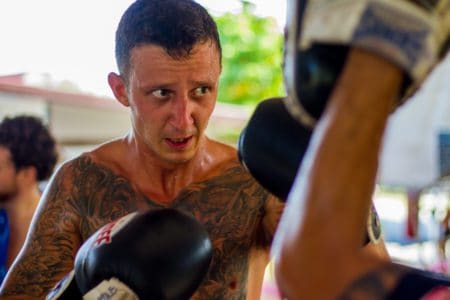 Usually a Muay Thai trainer is totally dedicated to his students and will take great pleasure from passing his knowledge on. However, he expects absolute respect and loyalty in return and unconditionally. If a student is not prepared to give this or questions the training regime then the relationship can very quickly break down, often irretrievably.
Usually a Muay Thai trainer is totally dedicated to his students and will take great pleasure from passing his knowledge on. However, he expects absolute respect and loyalty in return and unconditionally. If a student is not prepared to give this or questions the training regime then the relationship can very quickly break down, often irretrievably.
A particularly difficult clash of expectation to deal with relates to the employer/employee relationship. If the trainer has worked predominantly in Thai gyms, many will not have received direct payment for the work done. It would have been a relationship based on the exchange of favours. The trainer did the gym owner the favour of training the fighters. In return, the gym owner did the trainer the favour of providing them with food and accommodation. This fostered an atmosphere of always being in one another’s debt and, apart from anything else, made disciplining staff more difficult.
Such blurring of boundaries can cause a number of problems. The division between one’s private life and working life becomes less clear in these situations. Many Thai trainers do not leave their personal problems at the door when they come in to work. Indeed, it is often the case that these problems follow them into the gym, literally. We have had many angry wifes/girlfriends show up at our camp in the past. There is little regard for privacy when it comes to a Thai woman scorned!
The inappropriate use of social media by some Thai staff has been referred to in a previous blog: Social Media and Muay Thai
In a Farang business, the relationship between and employee is usually much more clear cut. The trainer is paid to do a job and if he persistently fails to do the job in a satisfactory manner, employment must be terminated. Such a clear cut employee/employer relationship leads to better standards in the gym. However, it can lead to great disappointment on behalf of the trainer who expects to have shortfalls overlooked in the same way as a family overlooks the shortcomings of a child.
The employment contracts we have go some way to clarifying expectations thereby reducing disappointment on both sides.
Atmosphere
When everything is going well, there is no better environment to be in than a Muay Thai gym. The trainers work hard to make the training effective but fun as well. People can be training to the limits of their endurance but still enjoying it. The atmosphere is welcoming and electric.
The more trainers there are in a gym, however, there more likely there are to be deep divisions lying below the surface. These are alluded to in this blog featured in Fightland about Phet Chimanee, head trainer at the largest gym in Phuket. Friendship circles amongst trainers, often formed over many years at their childhood gyms, are close. Trainers will be unquestionably loyal to others within their circle, regardless of any right or wrong doing. This is why you will often find that when one trainer leaves a gym, others who are close to him will follow.
Getting to the bottom of such divisions is difficult. Thais prefer to deal with problems in a non confrontational way. They usually elect not to talk openly about any difficulties they are experiencing. This can be confusing for all concerned and often takes a long time to unravel. To minimize the negative impact of any divisions that arise, a Farang employer must have Thai members of staff within the gym whom they can trust. A trusted advisor can assist in unraveling the problems. Ignoring them is not an option.
Prejudices
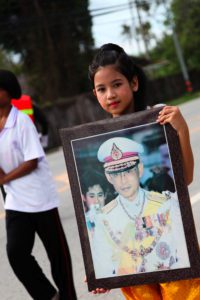 Despite all appearances to the contrary, Thai people are not nearly as open and welcoming as it appears. Thais are taught from an early age that their country comes first over all other considerations. They are extremely nationalistic. They tend to stick together no matter what the circumstances are. This can make life for a Farang employer tough! An employee’s loyalty does not lie with employer or the business first and foremost. Farang employers need to be very sensitive to this, being careful not to disrespect Thai culture and nationality.
Despite all appearances to the contrary, Thai people are not nearly as open and welcoming as it appears. Thais are taught from an early age that their country comes first over all other considerations. They are extremely nationalistic. They tend to stick together no matter what the circumstances are. This can make life for a Farang employer tough! An employee’s loyalty does not lie with employer or the business first and foremost. Farang employers need to be very sensitive to this, being careful not to disrespect Thai culture and nationality.
This also filters down to the gym floor. Understandably perhaps, trainers believe that only they as Thais fully understand Muay Thai. They resent being challenged or questioned about the training regime they offer. Students should always be well aware of this and show respect for their knowledge and experience. Not to do so can lead to alienation.
Positioning
As in most working environments, hierarchies establish themselves within any Muay Thai camp in Thailand. What is different though, is physical dominance often plays a greater role than anything else in determining who is who in the pecking order.
As far as imposing a structure is concerned, we have found offering the position of Head Trainer counter productive. In our experience this has led to an abuse of power and confusion amongst the Thai training staff as to who is in overall control of the business. We now give trainers specific roles and we do not use the term Head Trainer at all.
Natural order can be expressed in unusual ways. ‘Testicle grabbing” by dominant males happens a lot in Muay Thai camps. It is something that Farang males find quite threatening. However, it is not meant to be threatening at all. It is an expression of one’s ‘place’ relative to another in the gym. Thai trainers do it a lot to youngsters in the gym. It can lead to great discomfiture on behalf of Farang parents if it is done to their children.
Dominance is sometimes expressed in more unpleasant ways. Many people will have witnessed a young fighter being hit by his trainer if his performance is under par. It is often seen at the stadiums. Westerners find this shocking and offensive. For the Thais, however, it is normal and is seen as a way of showing who is in control.
Another thing that westerners feel uncomfortable with, and it is certainly discouraged, are instances of trainers putting students in ‘their place’. It is extremely unpleasant to see and fortunately it only relates to a minority of Thai trainers. Although it doesn’t make it right, knowing where this behaviour comes from at least helps to understand it. The trainer is doing what was done to him when he was young. Some trainers see it as their duty to remind a student who overestimates his ability that there is always someone bigger and stronger than them around. They believe this makes the student better prepared for going in to the ring.
Retention
Staff retention is a huge issue when it comes to running a Muay Thai camp in Thailand. This is a particular challenge for a Farang owner who does not have a core group of trainers who will be unquestionably loyal to them. Whether they are Farang or Thai owned, however, changeover of staff in the majority of Muay Thai camps is high. There are many reasons for this, most of which are completely out of our control. This blog has already covered how divisions in a gym can emerge, often leading to a whole group of trainers leaving and not just an individual. The competition to acquire Muay Thai trainers has grown alongside interest in the sport. Some gyms are not averse to poaching trainers from other gyms, with incentives often based on false promises. Our policy is to recruit trainers from outside Phuket to avoid conflict. Unfortunately other gyms do not operate the same policy.
In the Muay Thai business staff turnover can be very disruptive because trainers usually do not give any notice that they are planning to leave. They tend to tell you on the last day of the month after they are paid.
Motivation
Many students will have come across a minority of under motivated trainers. This sometimes emanates from poor management within the gym and sometimes from issues that the trainers themselves have. Trainers who have issues with alcohol, drugs and gambling are commonly encountered. All of these factors will impact on how they perform in the job. Over time we have learned how to avoid trainers with these problems. Generally speaking we have found that recruiting trainers who are fresh to gyms where Farangs train and who are younger results in a better experience for all.
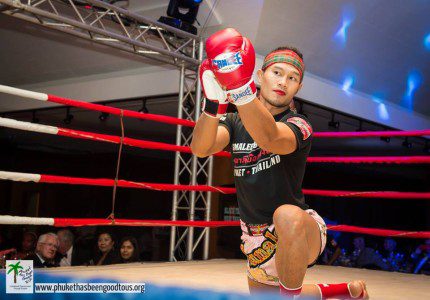
Photo: Jessi Cotterill Photography
If the right trainers are in place, motivation on a day to day basis is rarely an issue. Their love and immersion in the sport is motivation in itself. The energy and dedication of many Muay Thai trainers is a great thing to witness. The interest they show in a respectful student who is keen to learn often goes well beyond the call of duty.
The challenge for us is to retain them within our business. After all, being a Muay Thai trainer does not provide the promise of a good career structure. Money is a great motivator, especially for people who come from poor backgrounds and have an extended family to support.
Salary increases for our trainers are scheduled and they are informed of this when they join the gym. Additionally, if they stay for one year they are given a bonus of one month’s salary. Trainers also get a set number of paid days holiday a year. The allowance is above the requirement set down by Thai employment law.
Our offer at the gym means that we get an above average uptake of private lessons. Consequently, most months trainers earn well above the Thai national average salary.
We have also gradually been able to improve the trainer’s living conditions. They have fridges in their rooms, access to a washing machine, free internet and with our assistance most have air con in their rooms too. All are registered for social security, so they have access to free health care.
These measures seem to be working and trainer retention has improved. If these new terms and conditions continue improve staff retention, they will be well worth the expense involved.
Strengths
The past exposure to business of most Muay Thai fighters/trainers restricts them when it comes to running a profitable commercial enterprise. They also have very limited knowledge of company law. We treat the overall business and the Muay Thai side as completely separate functions. The trainers are responsible for running the training and fight program with limited interference providing everything is going well. This works and gives the trainers a feeling of autonomy and responsibility without burdening them with pressures they feel unable to cope with.
The Muay Thai trainers are the core of the business. With the right trainers in place, the energy and enthusiasm they show on a daily basis is a pleasure to be part of.
The aspect of their work that is most admirable is the way they take care of youngsters in the gym. This is a value learned from their gym backgrounds. The older trainers took care of the younger boys who more often than not were removed from their families in early adolescence. In our gym we are seeing more and more young children from overseas joining our training program. I sincerely hope this is a side of the business we can grow, as it is a key area of strength amongst our trainers. It is clear that the trainers get a great deal of reward from their interaction with children too.
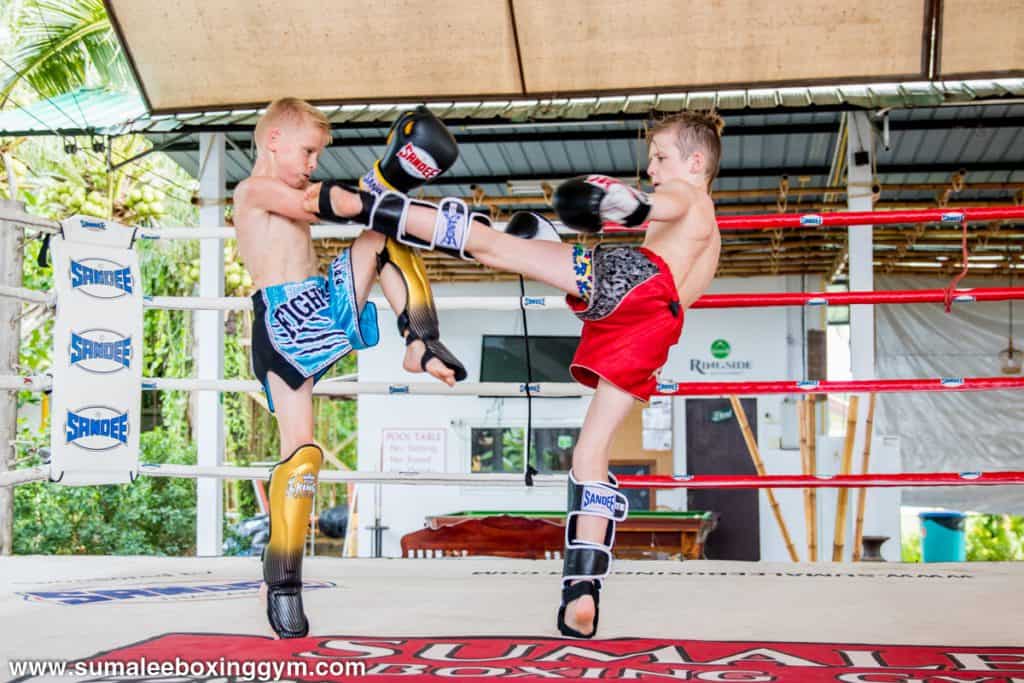
The observations above are amongst many I have made since being involved in the Muay Thai business. There are others and I will talk about over time. Nobody said it was going to be easy, and it isn’t. It’s a great challenge though and I embrace it.
It would be great to hear of other people’s experiences too. Please add them in the comments on the website or social media. If anyone is grappling to understand any experience they have had whilst training at a Muay Thai gym in Thailand please feel free to contact me if you think I can offer any insight (lynne@sumaleeboxinggym.com).
If you would like to know more about Sumalee and the story behind how we were established, you can find out more in Dr Lynne Miller’s book ‘Fighting for Success’.
Updated May 17th 2022

